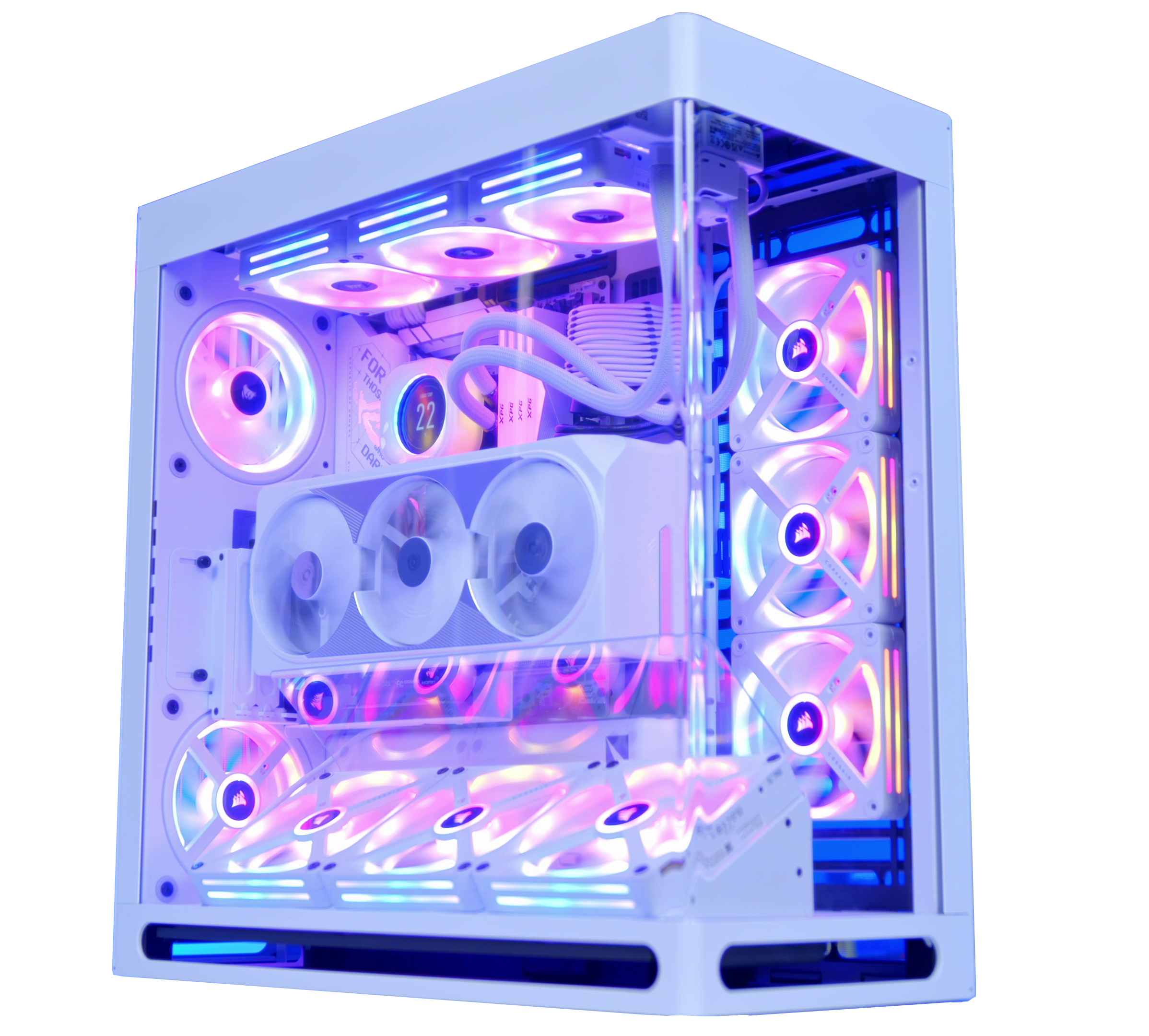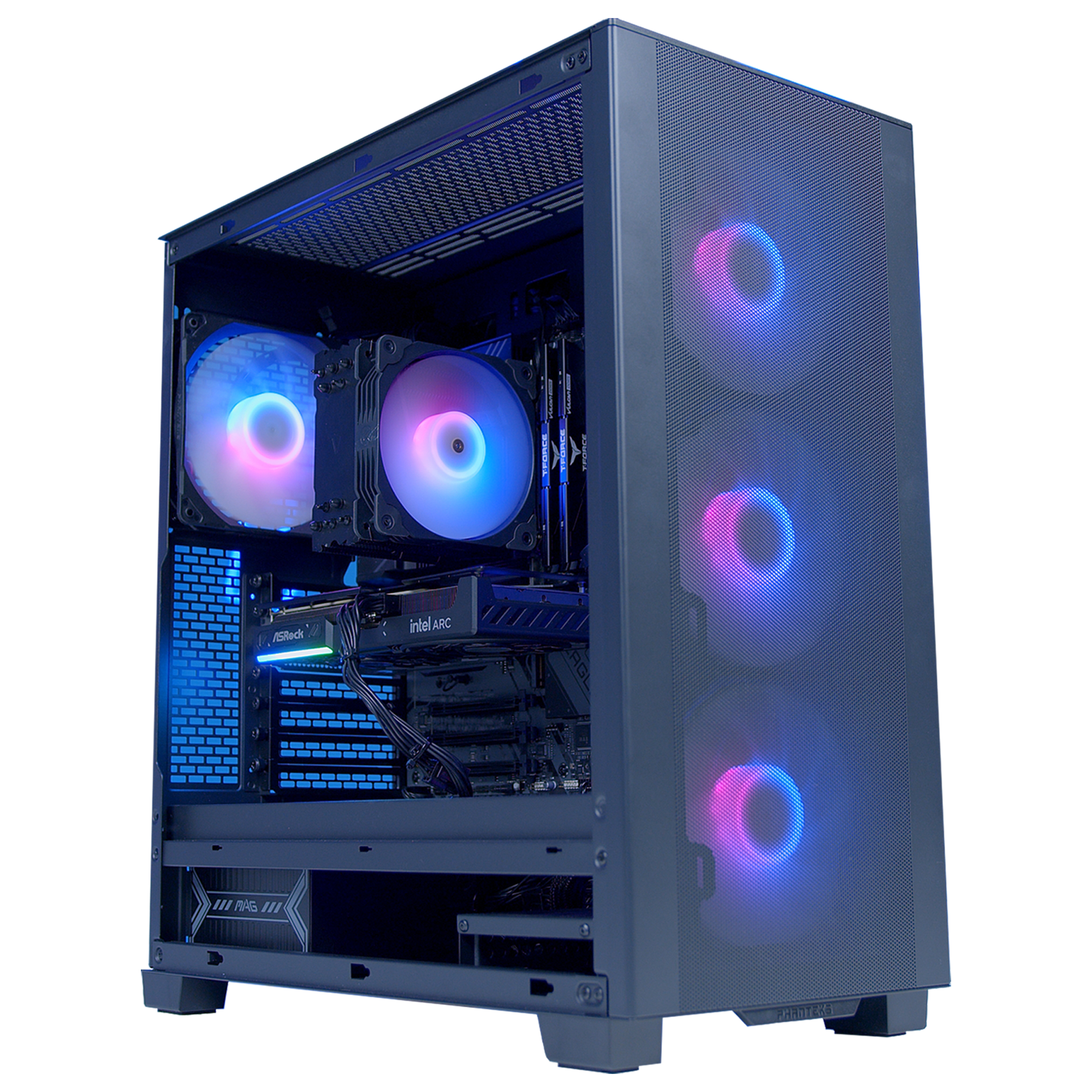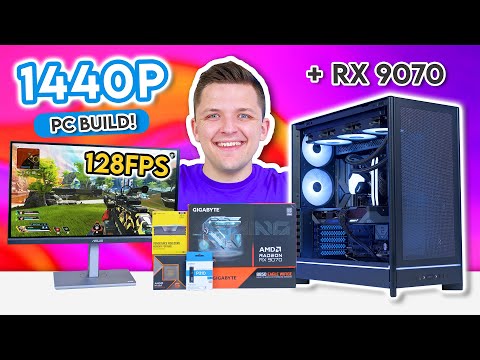🚚 Ships in 2-4 working days.
GeekaPC 'Flow' (RX 9070 / RX 9060 XT 16GB)
Have a question?
Share
Guaranteed Safe Checkout
The GeekaPC Flow offers gamers a highly ventilated chassis, designed to maximise airflow and maintain excellent thermals, while offering a striking and innovative aesthetic. Handling all of the gaming power in this build is the AMD Radeon RX 9070, a strong GPU that can handle your favourite Esports and AAA titles at 1440p and 1080p with ease. This system is also available with an RX 9060 XT 16GB, for those looking for a stunning PC for a more modest budget.
 Coming well equipped in the CPU department with a six-core, 12-thread AMD Ryzen 5 9600 Processor, the CPU for this build makes a perfect partner for either GPU offering at 1080p or 1440p.
Coming well equipped in the CPU department with a six-core, 12-thread AMD Ryzen 5 9600 Processor, the CPU for this build makes a perfect partner for either GPU offering at 1080p or 1440p.
 The Montech HyperFlow ARGB 360 ensures the Ryzen 5 9600 remains cool. This 360mm liquid cooling unit is equipped with three 120mm fans, which push cool air through the radiator. Each fan lights up with vibrant RGB, and the CPU pump block can be synced with various RGB software.
The Montech HyperFlow ARGB 360 ensures the Ryzen 5 9600 remains cool. This 360mm liquid cooling unit is equipped with three 120mm fans, which push cool air through the radiator. Each fan lights up with vibrant RGB, and the CPU pump block can be synced with various RGB software.
 The PC case housing all of these wonderful components is the Montech HS01. This is a unique chassis with a highly-ventilated design, built to provide strong airflow to promote great thermals. The HS01 has a sink-in fan design, showcasing them inside the chassis but without taking up additional space. There's plenty of room for modern graphics cards, and there's a small strip of RGB that spans the side and front of the case, offering some visual flair.
The PC case housing all of these wonderful components is the Montech HS01. This is a unique chassis with a highly-ventilated design, built to provide strong airflow to promote great thermals. The HS01 has a sink-in fan design, showcasing them inside the chassis but without taking up additional space. There's plenty of room for modern graphics cards, and there's a small strip of RGB that spans the side and front of the case, offering some visual flair.
 For RAM, this build uses a reliable Corsair Vengeance RGB DDR5 kit, offering great latency and speeds. Those looking to provide more oomph for their build can increase the RAM capacity from 32GB to 64GB.
For RAM, this build uses a reliable Corsair Vengeance RGB DDR5 kit, offering great latency and speeds. Those looking to provide more oomph for their build can increase the RAM capacity from 32GB to 64GB.
 Regarding storage, the Crucial P3 Plus has made a return. This is one of our favourite Gen4 NVMe M.2 SSDs, offering solid read and write speeds. The base configuration of the Pro PC comes with a 1TB drive, but this can be increased to 2TB and 4TB for those who need a bit more space for their favourite games.
Regarding storage, the Crucial P3 Plus has made a return. This is one of our favourite Gen4 NVMe M.2 SSDs, offering solid read and write speeds. The base configuration of the Pro PC comes with a 1TB drive, but this can be increased to 2TB and 4TB for those who need a bit more space for their favourite games.
Lastly, powering this build is the Corsair RM750e power supply. This is a 750W unit, and it features a fully modular cabling system and Cybenetics Gold efficiency rating, ensuring minimal power is lost as additional heat or noise.
This build has a dedicated video on the GeekaWhat YouTube channel where the host, James Cousins, details the entire step-by-step process. He covers each component's pros (and cons), along with a suite of gaming benchmarks at the end, providing an idea of how this system performs.
*Note: The GPU model shown in the video and attached photos is the Gigabyte RX 9070 XT Gaming OC. GeekaPC reserves the right to use any model of the RX 9070 XT as selected, depending on real-time availability.
CPU (Processor): AMD Ryzen 5 9600
The AMD Ryzen 5 9600 is a fantastic CPU when it comes to gaming at 1080p and 1440p. The reason we did not opt for the newer Ryzen 5 9600X instead is due to the limited performance upside.
CPU Cooler: Montech HyperFlow ARGB 360
This AIO (all-in-one) is more than capable of handling the temperatures of the Ryzen 5 9600, and it offers plenty of customisable RGB lighting, which can be configured within a range of software.
Motherboard: Gigabyte B850 Eagle WiFi6E
With strong connectivity, on-board WiFi and AMD EXPO support the B850 Eagle WiFi6E remains a firm favourite in our builds.
RAM: Corsair Vengeance DDR5 RGB
Corsair's range of RAM DIMMs provides a great option for builds powered by a TeamRed CPU. They offer better compatibility, reliability, and gorgeous RGB lighting.
SSD: Crucial P3 Plus
The Crucial P3 Plus is a firm favourite over on the GeekaWhat YouTube channel, with fast Gen4 NVMe speeds and a range of capacitites available.
GPU (Option 1): AMD Radeon RX 9070
The AMD Radeon RX 9070 is a reliable graphics card for 1440p gaming. It has 16GB of video memory, which is excellent for modern titles.
GPU (Option 2): AMD Radeon RX 9060 XT
The AMD Radeon RX 9060 XT is one of AMD's budget-oriented options of 2025. Equipped with 16GB of VRAM, this card is more than capable of offering high framerates at 1440p, putting it on par with NVIDIA's RTX 5060 Ti across a range of AAA titles.
Case: Montech HS01
The Montech HS01 is a case designed with form and functionality in mind. This chassis is highly ventilated promoting good airflow and has a sink-in fan design, maximising space while maintaining great visual flair.
PSU: Corsair RM750e
For a build like this, a strong 750w unit is perfect when it comes to power. The RM750e from Corsair is one of the best reviewed around.
Operating System: Windows 11
All of our systems come preinstalled with an activated copy of Windows 11 set to the 'Out of Box Experience'. This allows you to set the PC back up to your liking.
🎮 Cyberpunk 2077 - 1440P High
Settings: 1440p High, DLSS/FSR On, Frame Generation On, Texture Quality High, Crowd Density High, Contact Shadows On, Anisotropy x8
AMD Radeon RX 9070: 139 FPS AVERAGE
🎮 Hogwarts Legacy - 1440p High
Settings: 1440p High, Anti-Aliasing Mode High, Global Quality Preset High, Effects Quality High, Material Quality High, Sky Quality High, Texture Quality High
AMD Radeon RX 9070: 133 FPS AVERAGE
🎮 Fortnite - 1080p Competitive
Settings: 1080p Competitive, Anti Aliasing Mode TAA, Global Illumination Off, Reflections Off, View Distance Far, Textures Low, Effects Low, Post-Processing Low
AMD Radeon RX 9070: 262 FPS AVERAGE
🎮 Marvel Rivals - 1440p High
Settings: 1440p High, Graphics Quality High, Global Illumination Lumen GI- High Quality, Reflection Quality Screen Space Reflections, Model Detail High, Shadow Detail High
AMD Radeon RX 9070: 121 FPS AVERAGE
🎮 Alan Wake 2 - 1440p High
Settings: 1440p High, FSR Quality, Post-Processing Quality Medium, Texture Resolution Ultra, Texture Filtering High, Volumetric Lighting Medium, SSAO On
AMD Radeon RX 9070: 101 FPS AVERAGE
🎮 Apex Legends 1440p High
Settings: 1440p High, V-Sync Disabled, Anti-Aliasing TSAA, Texture Streaming Budget High, Texture Filtering x8, Ambient Occlusion Quality High
AMD Radeon RX 9070: 298 FPS AVERAGE
Please Note: Listed performance numbers are not guaranteed, and replicating these average frame rates will depend on a number of factors. These include: ambient room temperature, game settings used, resolution selected, game scene, game mode (e.g. online multiplayer vs offline single player) and more. All performance data captured using CapFrameX.

























